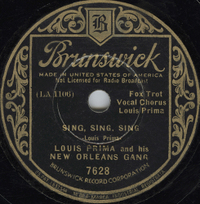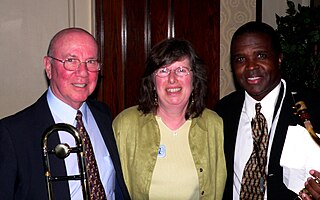
Eugene Bertram Krupa was an American jazz drummer, bandleader, and composer. Krupa is widely regarded as one of the most influential drummers in the history of popular music. His drum solo on Benny Goodman's 1937 recording of "Sing, Sing, Sing" elevated the role of the drummer from that of an accompanist to that of an important solo voice in the band.

Charles James Shavers was an American jazz trumpeter who played with Dizzy Gillespie, Nat King Cole, Roy Eldridge, Johnny Dodds, Jimmie Noone, Sidney Bechet, Midge Williams, Tommy Dorsey, and Billie Holiday. He was also an arranger and composer, and one of his compositions, "Undecided", is a jazz standard.

"Sing, Sing, Sing " is a 1936 song, with music and lyrics by Louis Prima, who first recorded it with his New Orleans Gang. Brunswick Records released it on February 28, 1936 on the 78 rpm record format, with "It's Been So Long" as the B-side. The song is strongly identified with the big band and swing eras. Several have performed the piece as an instrumental, including Fletcher Henderson and, most famously, Benny Goodman.

George Masso was an American jazz trombonist, bandleader, vibraphonist, and composer specializing in swing and Dixieland. Masso is notable for his work from 1948 to 1950 as a member of the Jimmy Dorsey band.
Herbert Harper was an American jazz trombonist of the West Coast jazz school.

Lady Day: The Complete Billie Holiday on Columbia 1933–1944 is a 10-CD box set compiling the complete known studio master recordings, plus alternate takes, of Billie Holiday during the time period indicated, released in 2001 on Columbia/Legacy, CXK 85470. Designed like an album of 78s, the medium in which these recordings initially appeared, the 10.5" × 12" box includes 230 tracks, a 116-page booklet with extensive photos, a song list, discography, essays by Michael Brooks, Gary Giddins, and Farah Jasmine Griffin, and an insert of appreciations for Holiday from a diversity of figures including Tony Bennett, Elvis Costello, Marianne Faithfull, B.B. King, Abbey Lincoln, Jill Scott, and Lucinda Williams. At the 44th Grammy Awards on February 27, 2002, the box set won the Grammy Award for Best Historical Album of the previous year.
The Metronome All-Stars were a collection of jazz musicians assembled for studio recordings by Metronome Magazine, based on its readers' polls. The studio sessions were held in the years 1939–42, 1946–53, and 1956, and typically consisted of two tracks which allowed each participant a chance to solo for one chorus. Earlier recordings feature more swing style, while the later sessions tend more toward bebop.
Steve Philip Jordan was an American jazz guitarist.
Chronological Classics was a French compact disc reissue label. Gilles Pétard, the original owner, intended to release the complete master takes of all jazz and swing recordings that were issued on 78 rpm. By the time the label suspended operations in July 2008, its scope had extended to LPs.

A Study in Frustration: The Fletcher Henderson Story is a box set compilation surveying studio recordings of the Fletcher Henderson Orchestra from 1923 to 1938, released in 1961 on Columbia Records, CXK 85470. It initially appeared as a four-album set produced by Frank Driggs and assembled by John Hammond, both of whom also wrote the liner notes. The set was part of a Thesaurus of Classic Jazz series on Columbia which included King of the Delta Blues Singers also worked on by Hammond and Driggs and released in 1961, the first album reissue of songs by blues legend Robert Johnson.

The Riviera is a marina and mixed-use meeting hall at the shore of Geneva Lake in Lake Geneva, Wisconsin, United States. Riviera Beach is an adjacent daily admission beach.
The Big Band and Jazz Hall of Fame is part of a US-based non-profit organization that began operations in 1978 and continues to the present (2022) in San Diego County, California. David Larkin is current president.
Karl Kiffe was an American jazz drummer featured in specialty numbers in a number of Hollywood feature films during World War II and later as a featured member of Jimmy Dorsey's orchestra.






